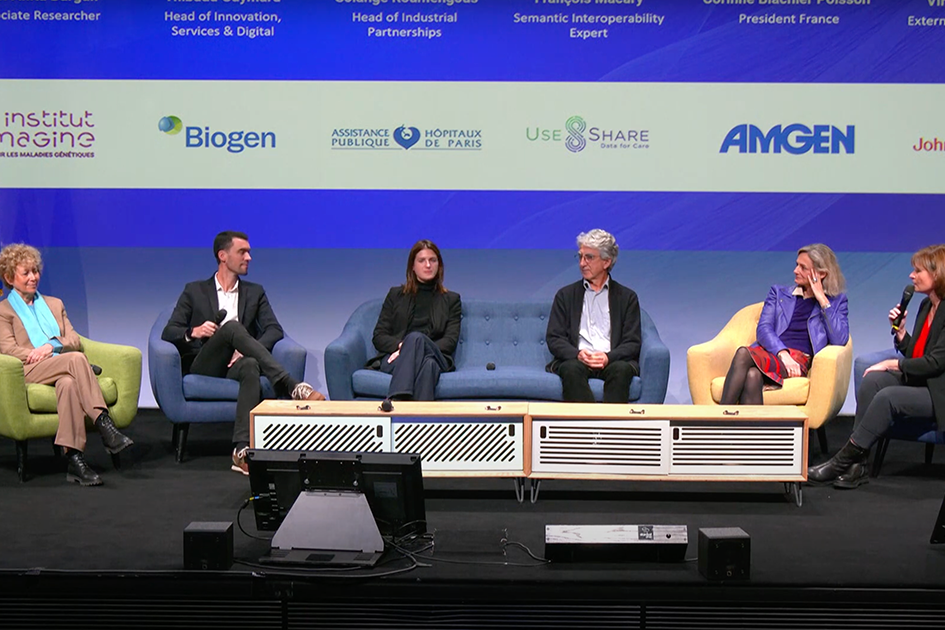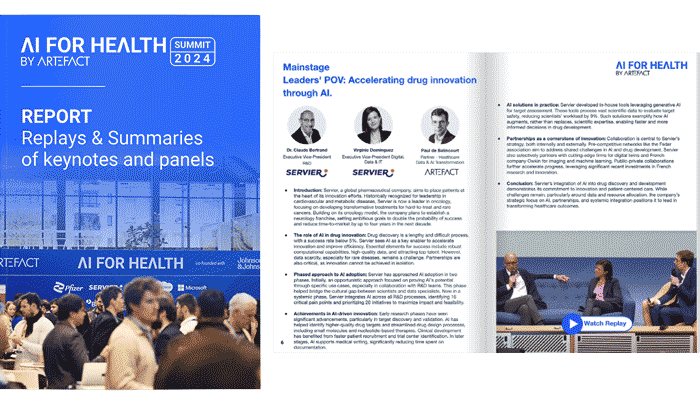Key learnings from panel discussion on "Strategic vision for rare diseases" with Prof. Anita Burgun, Associate Researcher at Institute Imagine, Thibaud Guymard, Head of Innovation, Services & Digital at Biogen, Solange Roumengous, Head of Industrial Partnerships at the French National Database of Rare Diseases, Corinne Blachier Poisson, President France at Amgen, and François Macary, Semantic interoperability expert at Use & Share.
Questions by Virginie Lasserre, External Affairs Director at Johnson & Johnson.
This roundtable at the AI for Health Summit 2024 focused on the use of health data and artificial intelligence to address diagnostic delays and impasses for rare diseases. With contributions from key players in research, healthcare, and industry, this discussion emphasized the need for collective mobilization to enhance the lives of over 3 million patients in France affected by rare diseases.
The CSF initiative
The Strategic Industry Committee (CSF) fosters collaboration between public and private sectors to improve France’s attractiveness in health innovation. The AI, Data, and Health program within CSF focuses on rare diseases, building on successful past initiatives in oncology. This choice stems from France’s robust ecosystem, including institutions like Institut Imagine and the National Rare Disease Data Bank (BNDMR), as well as significant AI expertise.
BNDMR and its role
The BNDMR is a national health data repository supporting research, care strategies, and diagnostics for rare diseases. It collects data through the BAMARA application, used by clinicians across France, to create a standardized dataset. Current AI projects include automating data extraction from patient records and developing methodologies for analyzing small datasets typical of rare diseases, with the aim of accelerating treatment access.
The need for comprehensive data
Institut Imagine advocates for integrating diverse patient data, from genetic studies to imaging, into multimodal AI algorithms. These models analyze holistic datasets to improve diagnostics and treatment. Cross-border collaborations, such as those with Canadian institutions, focus on model-sharing rather than data-sharing, ensuring privacy and fostering global progress in rare disease research.
The importance of interoperability
François Macary from Use&Share highlighted the critical role of interoperability in enabling AI to access and interpret data across systems. Standardized vocabularies like SNOMED CT, LOINC, and ORPHAcodes ensure that data can be shared and analyzed effectively. France is advancing in adopting these standards, essential for creating robust AI solutions and improving patient outcomes.
Biogen’s contribution
Biogen, a leader in innovative therapies for neurological rare diseases, stressed the importance of early and accurate diagnosis. Diagnostic delays of 5-8 years and high rates of misdiagnosis harm patients’ quality of life. Biogen is collaborating with the BNDMR and CSF to leverage AI for reducing these delays, aiming to deliver actionable results through collective projects by 2025.
Data quality as a priority
The success of AI initiatives hinges on high-quality data. CSF leaders emphasized the importance of evaluating data feasibility and ensuring transparency in data management. By improving data visibility and quality, France can create an attractive and effective health innovation ecosystem.
Conclusion
The collective ambition is to present concrete AI use cases by September 2025, demonstrating tangible progress in reducing diagnostic delays for rare diseases. By uniting public and private efforts, leveraging robust data infrastructure, and adopting interoperable standards, France is poised to lead in this transformative domain.

 BLOG
BLOG






